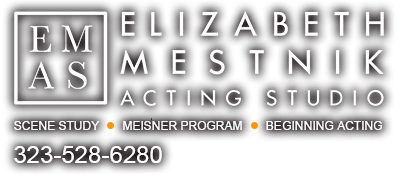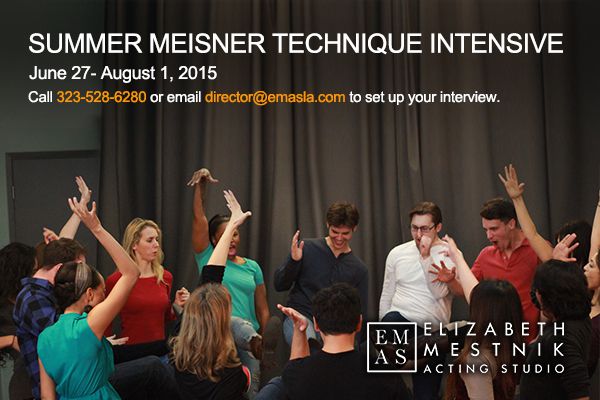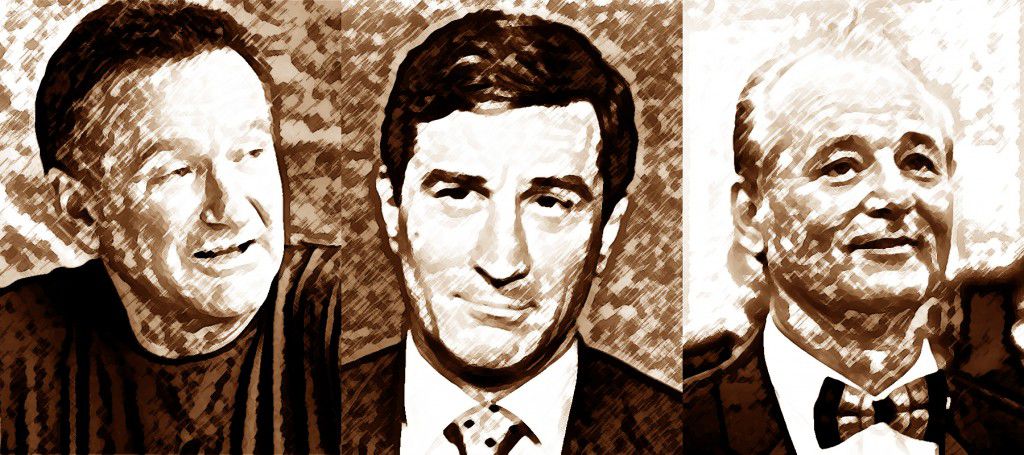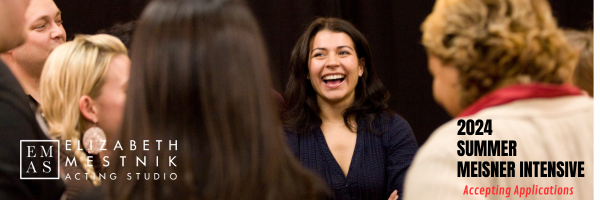Summer Meisner Technique Intensive
Summertime is here, and the Elizabeth Mestnik Acting Studio is proud to announce our Summer Meisner Technique Intensive. Meisner Technique is a transformative acting technique, which takes the actor away from the introverting exercises many methods practice, such as emotional recall and sense memory.
The Meisner Technique, on the other hand, seeks to do exactly the opposite. Meisner Technique believes in taking the intellect out of the acting process and having actors work entirely from their instinctive impulse. Sam Rockwell, Jon Voight, James Caan, Amy Schumer, Kathy Bates and Robert Duvall are just some of a long list of successful actors and actresses who have trained in the Meisner Technique.
The Elizabeth Mestnik Acting Studio is currently interviewing for their 5-week Summer Meisner Technique Intensive. Classes begin on June 27th and run 3 times a week until August 1st. Daytime and Evening sessions are available. These classes will stimulate your imagination, reconnect you with your emotions and excite your spirit and passion for acting.
At the Elizabeth Mestnik Acting Studio, we pride ourselves on turning good actors into great actors. That is why we have been ranked as Los Angeles top acting studio by CBS.
We want people who are passionate, enjoy a challenge and really want to grow. That is why admission to the Summer Meisner Technique Intensive entails a personal interview. If you believe in acting as a craft, if you want to exceed even your own expectations, this summer intensive is for you. Visit our website for more information on the Elizabeth Mestnik Acting Studio and the Meisner Technique. Call 323-528-6280 or email [email protected] today to set up your interview!
Now Interviewing for Meisner Technique Classes
As the fundamental philosophy behind our acting classes here at the Elizabeth Mestnik Acting Studio, we’re excited to have opened up registration for two different Meisner Technique classes in 2015.
More than just “acting,” the Meisner technique teaches the actor to be truthful and honest, with both themselves and the scene. As powerful as this is, it is nonetheless a skill which is achieved step-by-step. This is the wonderful thing about the Meisner technique – it lays down a path which allows the actor to gain self-knowledge and skills that eventually lead to acting out of instinct rather than intellect.
As of April, 2015, we’re accepting interviews for two classes which will take actors on the first steps into the Meisner technique: the Summer Meisner Intensive, and the Fall Meisner Program.
The goal of Summer Meisner Intensive is to fully immerse the actor in both the philosophies and the practices of the Meisner technique in a short period of time (three days a week for three hours at a time). Despite only lasting five weeks, the nature of the class allows students to not only become familiar with the Meisner technique but also to take the first significant strides towards becoming an emotionally honest and intuitive actor.
The Fall Meisner Program is an opportunity for students to begin their first year of the Meisner Technique or to continue into their second year of study. We truly believe that the power of the technique and the commitment of our acting coaches will give the student at either point in their studies the best opportunity to grow as an actor and a person.
Elizabeth Mestnik Acting Studio’s New Website!

We’re proud to announce the launch of Elizabeth Mestnik’s new website. Designed to be responsive to mobile phones and tablets, the full range of content will now be available to users no matter what device they’re using. As LA’s premier Meisner-based acting school, we believe the site will not only provide a more user-friendly experience, but also better provide information, ideas, and news that’s relevant to the LA acting community.
We’ve updated the site with a significant amount of new information regarding our studio itself. Anyone interested in acting, from beginners to experienced actors can see exactly what we offer. From pages that will provide more frequent updates on upcoming classes and events, to new pages that contain biographies of our teachers, coaches and alumni, our hope is that the new site allows the acting community to better understand who we are and more easily engage with us.
Furthermore, we pride ourselves on bringing experience and a unique technique to our students. Emasla.com is not just a place where actors can sign up for classes, but rather a place where anyone can come to better understand our methods and technique specifically, and the acting industry more generally, in particular how they relate to you as an actor; we’re happy to share our knowledge and experience on this new platform. We hope you like it!
Survey Results: Favorite Actors of 2014
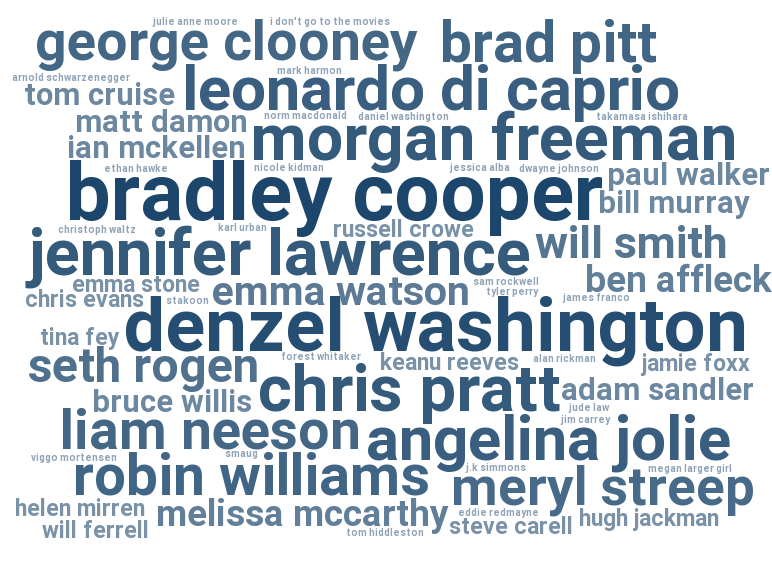
So the verdict is in and, overall, it’s not very decisive:
After conducting a poll of internet users asking them to answer the question, “Of all the actors who appeared in a feature film in 2014, who do you most respect or admire?” the most voted for actor was Bradley Cooper with 6.8%. Although not released in 2014, this is probably due in large part to his recent portrayal of Chris Kyle in American Sniper.
With a few exceptions, such as Chris Pratt, Bradley Cooper, and perhaps Matthew McConaughey, it seems that most people’s opinions of their favorite actors are not decided by one year’s work. Outside of these two, the other actors making up the top eight were Denzel Washington, Morgan Freeman, Jennifer Lawrence, Angelina Jolie, and Leonardo DiCaprio. Although these actors did feature in 2014 films, one could argue that their prior work had a greater influence on opinions than their performances over the last year.
When comparing male and female responses, the top two actors remain the same. However, across age groups, one begins to see a difference in the people’s preferences.
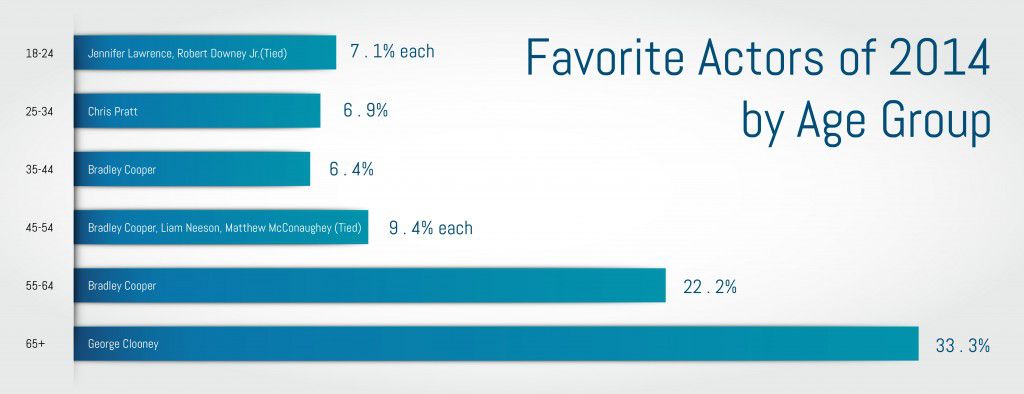
The clearest trend here is Bradley Cooper getting the most votes among the three age groups between 25 and 64. People clearly feel strongly about American Sniper’s political implications which likely influenced peoples votes (not to discount Cooper’s performance). The preference for Chris Pratt among 25 to 34 year-olds illustrates that he has an ability to strike a chord with this generation’s sense of humor. George Clooney among 65 and up? He’s an excellent actor, but as to why this age group? … your guess is as good as ours.
The nod to Robin Williams, ranked 12th overall, is worth noting. Despite not having any leading roles in blockbuster films in 2014, one can see his prominence in the survey as a well deserved tribute to an actor that managed to work his way into many hearts, both through his endearing comedic roles as well as his moving dramatic performances. (See our Improv Actors blog post.)
Lastly, a special thanks for the response “I don’t go to the movies.” … duly noted.
An Interview with Elizabeth Mestnik
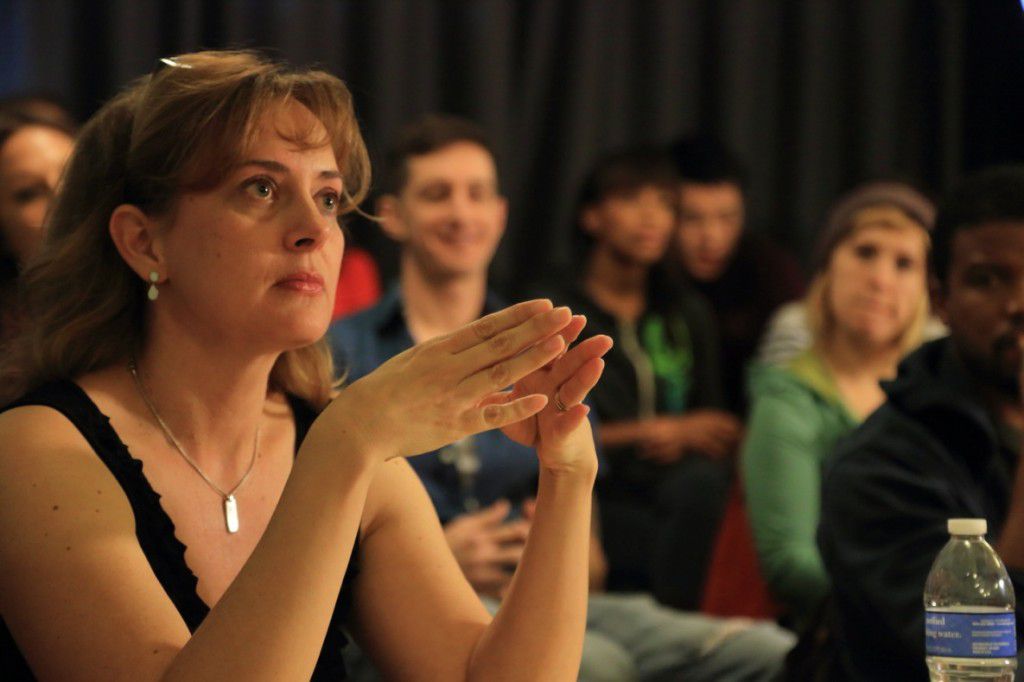
1. What made you decide to start the acting studio?
I had moved to LA from New York a few years earlier and tried to find a master class for people who had trained in a full 2 year “New York style” Meisner training program. After auditing a number of schools in town, I just didn’t find what I was looking for. I was teaching at another studio – and realized that if I wanted that – I was going to have to build it from the ground up. Some former students of mine encouraged me to start something on my own – with about 12 of them committing to the 2 year Meisner Technique syllabus. That was back in 2001. We started with one group meeting twice a week, just me, renting out a theatre space – and gradually we grew to where we are now, with our own studio, 9 classes a week, and 5 instructors.
2. What do you believe are the key advantages of the Meisner technique, when compared to other techniques of acting?
It’s all about working from impulse rather than intellect. Every part of the exercises is geared to keep the actor working from their instinctual self. Because it’s improv based – the actors are required to really stretch their imaginations – and that is invaluable because the imagination is limitless. Some other techniques tether you to your own life’s experiences – which is really quite limiting. Meisner asks that you keep expanding your connection to the imagination. Also, it is a building block technique. What that means is that each step builds upon the prior step. So if you do step a, then step b, then step c you will end up at d. It gives the actor a reliable process that they can do EVERY time. It gives them a craft – and that is so much better than throwing the mud up against the wall to see what sticks.
3. What are some of the attributes that make for great acting students?
Fearlessness, empathy, discipline, curiosity, a vivid imagination, a desire to have their voice heard, and a strong and supple instrument that allows for all that to be revealed in the character.
4. What are some of the most difficult challenges your students face, and how do they overcome them?
Tension is always a big issue, it is what blocks a student from their impulse. It keeps them from having a free voice and physicality. It prevents them connecting emotionally to their partners or the circumstances of the scene. Often times students don’t even realize they are tense. The tension has become such a habit it feels “normal”. The first thing we do to help them is make them aware of it. That’s half the battle – when they find themselves gripping, or holding their breath in certain moments they can release. WE also have a series of breathing and focus exercises that help.
. How are classes at your school different from classes in a traditional classroom? Well if you mean by traditional classroom something like your high school English class – well – this isn’t anything like that. Most of the work is done on our feet, up and moving around. Acting is a kinesthetic process – students have to feel it in their bodies – not just in their brains. We learn everything by doing.
6. What are some of the specific areas your courses focus on?
We have 2 main branches of our actor training. Our professional program is based on The Meisner Technique as I was taught it by William Esper and Maggie Flanigan. That is a 2-year program where the classes meet twice a week. We discovered many years ago however that many people are interested in the acting process but don’t know enough about it to commit to something like our Meisner Program. That is why we developed our Basic Technique series. This offers 3 different 12 week sessions that meet once a week. It is a more traditional style of training, pulling from a variety of techniques. It exposes students to how actors develop characters, break down scripts, expand the imagination and develop an expressive instrument.
7. What are some common misconceptions people have about the acting profession?
That you either have it or don’t. You need to have some basic talent for it – but it is a skill set that can be taught and developed.
8. The acting studio has been running now for nearly fifteen years, and many of your classes fill up quickly. What do you believe are the key factors of the studio’s success?
Quality control. We are a small studio, with small classes so that we can focus on the students individual needs. Our teachers are invested in each student. Because we only take 90 students we can focus our time and energy on classes rather than on marketing and advertising.
9. Can you think of any key thing (or things) you’ve learned since the studio first opened? That this craft is more important than ever. True connections between people is harder and harder these days. Our communication is now buffered by technology and our vulnerability is protected by a screen. Student actors come into class craving human connection on the deepest level. Movie and theatre goers ask the actors to experience these honest connections so that they can vicariously live through them. Actors are becoming society’s conduit to a fully felt and experienced life. It’s a huge and wondrous responsibility.
For more information on classes, schedules, and our philosophy please check out the studio’s website.
Improv In Action
IMPROV IN ACTION: THREE GREAT ACTORS WITH STRONG IMPROV ROOTS
Improvisation is all about spontaneity, and existing within the moment. You have to work from the impulse rather than planning what will happen. Put simply, improv is about listening, acceptance, and authenticity. In improv comedy, it’s easy to find great examples these days of master improvisers. Steve Carrell, Will Ferrell, Sascha Baron Cohen, Amy Poehler, and Jim Carrey have each made their careers as comedic improvisers. Entire TV series have begun from improvised scripts like “The Office” , “Workaholics” , and “Parks and Recreation.” But improv isn’t just for comedy. Some the best improv masters are highly respected for their dramatic roles, including some of the greats: Robin Williams, Bill Murray, and Robert De Niro.
Robin Williams, who attended Juilliard for acting, was performing comedy in nightclubs when he was discovered and asked to audition for what would become his breakout role as the alien called Mork, from “Mork and Mindy.” Williams is said to have improvised almost entirely on the dialogue for this character from the very beginning, leading writers to stop writing dialogue for him entirely. Williams also improvised most of his dialogue as the genie in “Aladdin” as well as an entire scene in his Academy Award winning performance in “Good Will Hunting.”
Bill Murray actually began his career in improv as a young man in Chicago’s Second City improv comedy troupe. Later on he took his comedic talents to the National Lampoon Radio in New York City, which led him to be discovered and brought on to Saturday Night Live. Most famously, he created almost all of his own dialogue in the cult classic, “Caddyshack,” including the “Cinderella Story” bit in the film. He also improvised his entire Peter Venkman character for “Ghostbusters” and an entire scene of dialogue for the movie “Tootsie.” Now Murray has been acclaimed for his dramatic work as well, showing that the honesty he found in improv has given him great range.
Robert De Niro was only 17 when he dropped out of high school and auditioned for Stella Adler’s Academy in New York. Most well known for his dramatic roles, De Niro is a fantastic example of incredible improv coupled with Meisner-style acting. The Meisner Technique is an improvisationaly based training which demands that the actor respond from their instincts rather than their intellect. He is most well known for his entirely improvised scene talking to himself in front of a mirror during “Taxi Driver.” He is also said to have improvised most of the script and dialogue ideas for “Goodfellas” with his fellow actors in rehearsal.
Improvisational skills can improve any actor as it requires the actor to respond spontaneously in character. This spontaneity is a fundamental philosophy in acting- to be so deeply in character that your thoughts and actions are fluid and authentic. Even when adhering to a script, the best actors will use the impulses they have developed in improv to keep the scene spontaneous. While improv lends itself well to comedy, a true master can utilize improvisation in all types of roles and genres.
At Elizabeth Mestnik’s Acting Studio, we strive to foster this spontaneity and engagement in our students.
Happy Holidays!

All of us at Elizabeth Mesnik’s Acting Studio would like to wish you a Merry Christmas and Happy Holidays! We hope the season is full of warmth and Cheer!
Check out our Schedule for the New Year, including our a new class in the “Technique” series beginning on the January 6th .
The Meisner Technique
The Meisner Technique has helped turn many actors into household names. It was developed in the 1930s by Sanford Meisner, who would continue to refine it for the next fifty years. Developed at the Neighborhood Playhouse in New York, it is considered one of the most systematic and holistic acting techniques in the western world. It has made a strong influence not only on American acting and culture, but on European acting as well.
A traditional Meisner Training Program is taught over a two-year period. In contrast to Emotional Recall, where actors recall emotions from memories of actual experiences, the Meisner Technique believes that the imaginary world is a stronger and healthier way to draw out an actor’s emotions. It defines acting as “living truthfully under imaginary circumstances”, requiring actors to respond from their instincts rather than their intellect. It is a step-by-step, improvisational process that demands the actors be truthful in every moment. The first year focuses on the actors finding how they, themselves would truthfully respond in a whole slew of imaginary circumstances, whether they be joyous, maddening or devastating. The second year continues this work in the realm of creating characters quite different from the actor with the same sense of truth. When the Meisner technique is taught, it begins with simple repetition exercises using one or two sentences, then builds on this to eventually work with complex improvisations and eventually scripts.
The Meisner technique is used by countless actors on stage and in film, including Sam Rockwell, James Gandolfini, David Duchovny, Allison Janney, Kathy Bates, Robert Duvall, James Franco, Jeff Bridges, Jeff Goldblum, Naomi Watts, Stephen Colbert, , and many others.
Guess who will be nominated for the Oscars?

Guess who will be nominated for the Oscars?
Find out on January, 16 2014
Happy Holidays to Everyone
We would like to wish you Happy Holidays
Happy Holidays 2013

